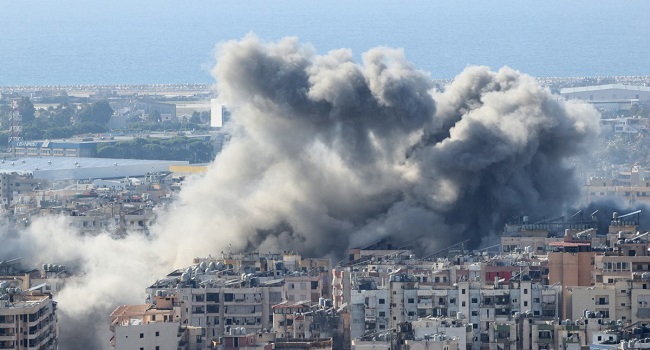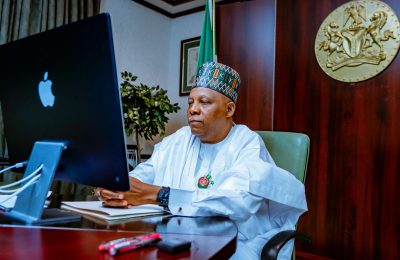A ceasefire deal in Lebanon between Israel and the Iran-backed militant group, Hezbollah has been signed.
Celebratory gunshots were heard in Beirut, where people took to the streets to cheer the end of hostilities.
US President Joe Biden announced a ceasefire deal to end 13 months of fighting between Israel and Hezbollah, the Lebanese militia supported by Iran.

In a joint statement, the US and France said the agreement would cease fighting in Lebanon and “secure Israel from the threat of Hezbollah and other terrorist organisations.”
This is what we know about the ceasefire deal from official briefings and media reports.
The ceasefire is meant to be permanent
US President Joe Biden told reporters that the agreement was “designed to be a permanent ceasefire”.

“Today, I have some good news to report from the Middle East. I just spoke with the prime minister of Israel and Lebanon. I’m pleased to announce that their governments have accepted the United States’ proposal to end the devastating conflict between Israel and Hezbollah. I want to thank President Macron of France for his partnership in reaching this moment.
“This is designed to be a permanent cessation of hostilities. What is left of Hezbollah and other terrorist organizations will not be allowed, I emphasise, will not be allowed, to threaten the security of Israel ever again,” Biden said.
Under the terms of the ceasefire, over 60 days Hezbollah will remove its fighters and weapons from the area between the Blue Line – the unofficial border between Lebanon and Israel – and the Litani River, about 30km (20 miles) to the north.
Hezbollah fighters will be replaced by Lebanese army forces in that area, who will ensure that infrastructure or weaponry is removed and that it cannot be rebuilt, according to a senior US official.
Over the same 60 days, Israel will gradually withdraw its remaining forces and civilians, Biden said, adding that it would enable civilians on both sides of the border to return to their homes.
Does the ceasefire cover the ongoing fight in Gaza?
The ceasefire doesn’t cover the ongoing fighting in Gaza between Israel and Hamas, another militant group backed by Iran. But Hamas said it, too, is ready for a truce.
Agence France-Presse says a senior Hamas official told it, “We have informed mediators in Egypt, Qatar and Turkey that Hamas is ready for a ceasefire agreement and a serious deal to exchange prisoners,” adding that Israel was blocking an accord.
Hamas official, Sami Abu Zuhri earlier said Hamas “appreciates” Lebanon’s right to reach an agreement that protects its people and hopes a deal to end the war in Gaza can be reached.
Biden’s announcement came as Israel’s cabinet approved the ceasefire after urging from Israeli Prime Minister Benjamin Netanyahu.
The war between Israel and the Iran-backed group has killed almost 3,800 people in Lebanon over the last year and left about 16,000 others wounded.
5,000 Lebanese troops will replace Hezbollah
The Lebanese army is expected to deploy 5,000 troops to the south under the agreement, according to a US official.
However, questions remain about their role in enforcing the ceasefire, and whether they would confront Hezbollah if needed, which would have the potential to exacerbate tensions in a country where sectarian divisions run deep.
The Lebanese army has also said it does not have the resources – money, manpower and equipment – to fulfil its obligations under the deal, although that could be alleviated by contributions from some of Lebanon’s international allies.
But many Western officials say Hezbollah has been weakened and that this is the moment for the Lebanese government to re-establish control over all the country’s territory.
The US and France will monitor the implementation
The agreement largely tracks UN Security Council resolution 1701, which ended the 2006 war between Israel and Hezbollah.
Under resolution 1701, areas south of the Litani should be free of any armed personnel or weapons other than those of the Lebanese state and the UN peacekeeping force.
But both sides claimed violations of the resolution.
Israel says Hezbollah was allowed to build extensive infrastructure in the area, while Lebanon says Israel’s violations included military flights over its territory.
This time, the US and France will join the existing tripartite mechanism, which involves Unifil, Lebanon and Israel, which will be charged with monitoring violations, the senior US official said.
“There will be no US combat troops in the area, but there will be military support for the Lebanese Armed Forces, as we’ve done in the past. But in this case, it’ll be typically done with the Lebanese army and in conjunction with the French military as well,” the official said.
Biden also said: “Hezbollah terrorist infrastructure in southern Lebanon will not be allowed to be rebuilt.”
Israel claims the right to respond to violations
Prime Minister Netanyahu said that Israel would “maintain full freedom of military action” in Lebanon “with the United States’ full understanding”.
“If Hezbollah violates the agreement and tries to arm itself, we will attack. If it tries to rebuild terrorist infrastructure near the border, we will attack. If it launches a rocket, if it digs a tunnel, if it brings in a truck carrying rockets, we will attack,” he asserted.
Biden supported that view, telling reporters: “If Hezbollah or anyone else breaks the deal and poses a direct threat to Israel, then Israel retains the right to self-defence consistent with international law.”
But he also said the deal upholds Lebanon’s sovereignty.
The Israeli demand for the right to strike back is not believed to be part of the ceasefire agreement because it was rejected by Lebanon. To get around the issue, media reports had suggested that the US would issue a letter supporting Israel’s right to act.
Over the next 60 days, the Lebanese Army and state security forces will take control once again, he said, and Israel will gradually withdraw its remaining forces. Since the war with Hezbollah began, over 70,000 Israelis have been “forced to live as refugees in their own country,” Biden said, and over 300,000 Lebanese people have also been forced from their homes.
“Let’s be clear. Israel did not launch this war. The Lebanese people did not seek that war either, nor did the United States.”
Echoing remarks from earlier from Netanyahu, Biden said if Hezbollah or anyone else breaks the deal and poses a direct threat to Israel, then Israel retains the right to self-defense.
And in a joint statement later released by Biden and French President Emmanuel Macron, the two leaders said that “the announcement today will cease the fighting in Lebanon, and secure Israel from the threat of Hezbollah and other terrorist organizations operating from Lebanon,” adding that it “will create the conditions to restore lasting calm and allow residents in both countries to return safely to their homes on both sides of the Blue Line.”
Netanyahu said earlier Tuesday that the war cabinet had approved the ceasefire, and he urged ministers in the full cabinet to approve the deal on Tuesday night.
He did not give specifics, but he said if Hezbollah breaks the terms, Israel will “respond severely.”
Netanyahu also held meetings Tuesday in Tel Aviv with various government ministers, lawmakers and mayors from some of the northern towns that have been evacuated for months.
Lebanon’s government also had to unilaterally approve the deal on Tuesday, but the U.S. official said that was expected.
The ceasefire would end the deadliest war in Lebanon since its civil war, which ended in 1990.
ALSO READ FROM NIGERIAN TRIBUNE
War crimes allegations: ICC issues arrest warrants for Israel’s Netanyahu, Hamas leaders







